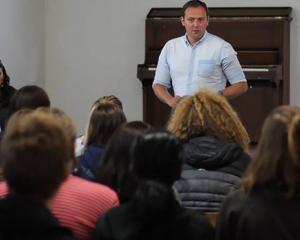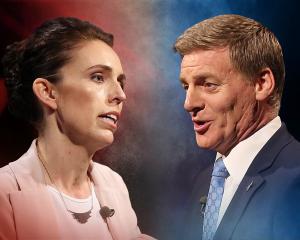Is the surge in support for the Greens the result of the party doing most things right? Or is it simply down to almost everything going wrong for Labour?
The latter is probably the dominant factor in the rise and rise of the Greens. The party is now nudging the psychologically important 10% mark - and in one poll this week actually bettered it.
But there are no obvious signs the Greens are getting this additional support from a fresh source of votes. The centre-left's share of the overall vote is not really growing. It seems likely the Greens are simply the beneficiaries of Labour's journey into political hell.
Voters switching back and forth between Labour and the Greens would seem to explain the sometimes wild fluctuations in support for the latter party from poll to poll compared to the other smaller parties whose ratings are almost static.
This raises questions of whether those decamping from Labour will stick around until election day. This where the Greens doing things right comes into play.
Those voters have to be given good reasons for sticking around once their protest at Labour's increasingly dishevelled state starts to fade.
The major Opposition party is now almost welcoming the respite offered by wall-to-wall Rugby World Cup. During the past week there has been more talk of the two "Camp Davids" - a play on the American president's country retreat near Washington DC.
The term has become shorthand for describing the two cliques in the Labour caucus seen to be vying for the party leadership after the election. - the backers of David Cunliffe and the supporters of another front-bencher, David Parker.
However, following the damage inflicted on Phil Goff by the leaking of a suggestion that he offered to resign the leadership at meeting of the party's front-bench MPs, word has gone out from the leadership that if there is any more monkey-business before the election, then Mr Goff and Annette King will make life very uncomfortable when the wannabe leaders lock horns over who succeeds Mr Goff.
The warning was aimed squarely at the Cunliffe camp - the suspected source of the leak. The muscle-flexing has brought a truce which, along with the cup-enforced hiatus, will allow Mr Goff to come out all guns blazing when the official election campaign begins a week after the final game.
The Greens, however, are resigned to some voters drifting back to Labour in the latter stages of the campaign. There is also worry that their support may peak too early.
The best insurance against that happening is to ensure the party remains relevant during the campaign by being relevant to the question of who governs afterwards.
A positioning statement hammered out by the Greens in June states that it is "highly unlikely" they will strike a post-election deal with National.
Keeping the door ajar, however, means the party remains a player during the campaign, rather than being sidelined had it declared it could only ever work with Labour.
It is likely John Key will want to talk to the Greens after the election - and may have some new ideas on how they and National might work together.
Given the weakened state of the Maori Party, Mr Key may well be looking for another party to his left to balance the influence of Act New Zealand to his right. That will be the case even if National secures an absolute majority in the next Parliament.
Given doubts about the long-term survival of Act, National's lack of obvious support partners dictates that it continue to keep potential allies sweet in the interim. That opens up possibilities for the Greens of more joint projects with National in problem areas where the two parties largely agree on the solutions.
Any expansion of this delicate relationship might well be assisted by not having to worry about a confidence and supply agreement. The likely absence of any such agreement whether or not National gets its majority means the Greens will not be able to sell themselves as a moderating influence on National. But they can say they will be getting things they want done in association with National.
Such pragmatism is matched by the Greens being far more focused in the way they campaign.
One of the Greens' major failings since they got elected to Parliament in their own right in 1999 is that their fighting on behalf of any worthy cause going meant voters have found it hard to discern the party's priorities. This was coupled with rarefied debate about the link between economic policy and protecting the environment which was a world away from the average person's interface with the economy.
While Rod Donald had begun to address that deficiency before his untimely death, Russel Norman, his successor as co-leader and finance spokesman, has sought to eradicate the notion that the Greens are "flaky" or "nutty"on economic policy.
Mr Norman has cut through the verbiage to a simple message: no environment; no economy. He has also brought the Greens into the mainstream economic dialogue. In that regard, he has has attacked the amount of debt being run up by National, at times sounding like a politician much further to the right.
That - like his stylish suits - serves a purpose. It is designed to say the Greens understand the need for fiscal discipline even though they would have a vastly different tax structure.
The party plans to keep courting voters for the long-term with solid, sustainable policy. It knows Labour will be back in force one day even if its vote is now falling through the floor. Even so, this election may be the best chance the Greens have in a long time to graduate from minor party bit-players to medium-sized participants in the power game.
• John Armstrong is The New Zealand Herald political correspondent.










